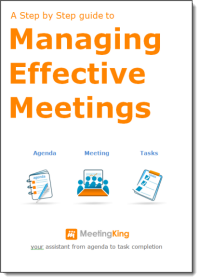Yesterday I was trying to schedule a meeting with a client, with very little success. The next few days were fully booked (including Friday) with his meetings, as were Monday, Tuesday and Thursday. We managed to squeeze in a meeting on Wednesday between a business lunch and a job interview.
He isn’t the only one. More and more people I talk to have meetings plastered all over their calendar from eight in the morning to eight in the evening, with a few sprinkled in on Saturday, just to make sure that they are taking full advantage of the week.
But do they really NEED all those meetings, or are some of these meetings just a waste of time?
To give you an example, just stop reading this post for a minute, and take a look at your own calendar. Go on, I’ll wait.
Back? Good.
Now I’ll ask you a few questions:
- How many of those meetings will help move your business or your project forwards?
- How many of those meetings don’t have a specific goal, let alone an agenda?
- How many of those meetings are just updates that can be done by email?
- How many of those meetings do you really have to go to?
At the end of the day, it’s very simple.
A meeting that doesn’t do something to drive your business forwards – and it can be a meeting with a new supplier, a potential investor, a job applicant or a peer who has experience – doesn’t help you.
A meeting that doesn’t have a specific goal, even if it’s a mental goal in your head (“hire or dismiss him”, “learn how to manage landing pages”), won’t go anywhere, and you’ll leave it feeling frustrated.
A meeting that is just a list of updates, with no discussion or debate just isn’t needed. Send an update email (or ask one to be sent), have a 10 minute stand-up in the room with one person giving the updates or even just grab one of the team members in the hallway and ask them a few questions.
Last, but not least, are there meetings that you don’t need to go to? You’ll probably be surprised at the number of those meetings in your calendar. General purpose meetings for which the organizers simply invited everyone they know, highly focused meetings about subjects that you know nothing about, and meetings with people that look good on paper, but that you know won’t get you anywhere (see question 1).
And why do you need to get rid of these meetings?
Freeing up time from these unnecessary meetings means that you have more time to focus and improve on the meetings that you DO need to do. You can prepare yourself better, make sure that all the meetings have goals and agendas, follow up on tasks and decisions, and of course – you have more free time to get work done as well.
MeetingKing can help you get the most out of your meetings. Sign Up Now.


